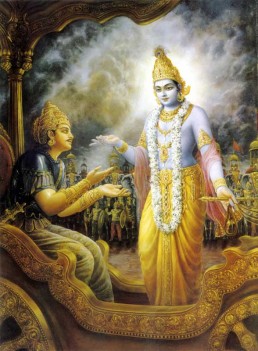Swami Chinmayananda
Swami Chinmayananda Commentary
It is clearly brought out here that the above technique can bless us not by a mere study of it, but only when it has been properly practised in life. The term religion (matam) in Sanskrit, means ‘opinion.’ This is “Krishna’s opinion” — Sri Krishna’s Matam. The philosophy of spirituality is universal and, therefore, the same everywhere. But religions differ from prophet to prophet, because there are many different OPINIONS entertained by these different Masters, regarding the best manner by which their particular generations could be guided towards the final experience of the Eternal-Factor.
One ought not to live through life as a mere beast of burden doing its daily routine and sweating under the driver’s whip. Work only hardens the muscles; it can smoothen out the ugly wrinkles in our character and add a glow of health and vitality to our inner personality only when we bring the inner equipments of our heart and head into the work which our hands and legs perform in the outer world. This is accomplished by pursuing the Karma Yoga advised earlier, with full faith (Shraddha) and without cavilling (Anasuyantah).
FAITH (Shraddha) — is a very pregnant word in Sanskrit which refuses to be defined fully by any single word in English.
But Shankara’s explanation of Shraddha has a purely intellectual import and it has no direct emotional appeal for the seeker. “Faith” in Vedanta means the ability to digest mentally, and comprehend intellectually, the full import of the advice of the Saints and the declarations of the Scriptures. In fact without “faith” no activity is ever possible; and “faith” cannot grow where intellectual convictions have not come to play in their full blaze.
WITHOUT CAVILLING (Anasuyantah) — A mere intellectual theory cannot be understood and appreciated without our adverse criticisms of it. We criticise to know and understand more exhaustively a piece of knowledge. But here, Krishna is advising a technique of living which cannot fulfil itself in our life through mere criticism and questioning. Krishna is warning Arjuna that he will neither understand fully, not come to gain the blessings of that Way-of-Life, by deep study and noisy discussions. It can be understood and experienced ONLY by living it.
THEY TOO ARE FREED FROM WORK — Immature students of the Geeta have been seen to cool down in their enthusiasm when they meet with the use of such terms. All through the chapter Krishna was insisting that man should act — act diligently and rightly. All of a sudden He points to a strange-looking goal, WORKLESSNESS. Naturally, an intelligent reader immediately comes to feel a disgust at this ugly paradox. This is mainly because of our lack of appreciation of the term in its native Scriptural import.
Earlier we have explained how the IGNORANCE of our Spiritual Nature gives rise to DESIRES, which in their turn cause THOUGHT-AGITATIONS, and also how WORK is nothing other than thoughts fulfilled among the sense-objects. Thus, the “State of Workless-ness,” is itself the “State of Thoughtless-ness,” which indicates the “Condition of Desireless-ness.” Absence of all desires can come only when we rediscover the All-full Nature of the Self. In short, with the Knowledge of the Self, when spiritual “ignorance” is terminated, desires can no more arise. Thus, the term “FREED FROM WORK” indicates the state beyond “ignorance,” or the State of Self-hood.
This Supreme State, no doubt, can never be reached purely through work. Parliament Street is not the Parliament; but having reached Parliament Street, the Parliament cannot be very far away; one cannot miss reaching the Parliament there. Similarly, Karma Yoga is extolled here as the “Path” that takes one ultimately to the Supreme, because through desireless activity one achieves Vasana-purgation, thus making the mind purer and subtler for meditative purposes.
AS CONTRASTED WITH THE ABOVE, SHRI KRISHNA EXPLAINS WHAT HAPPENS TO THOSE WHO CARP AT THIS THEORY OF RIGHT ACTION:
Adi Sankara Commentary
Ye, those; manavah, men; who (nityam, ever;) anutisthanti, follow accordingly; me matam, My teaching- this teaching of Mine, viz that ‘duty must be performed’, which has been stated with valid reasoning; sraddhavantah, with faith; and anasuyantah, without cavil, without detracing Me, Vasudeva, the Teacher [Here Ast. adds ‘parama, supreme’-Tr.]; te api, they also, who are such; mucyante, become freed; karmabhih, from actions called the righteous and the unrighteous.
The Bhagavad Gita with the commentary of Sri Sankaracharya – Translated by Alladi Mahadeva Sastry
Holy Geeta – Commentary by Swami Chinmayananda
The Bhagavad Gita by Eknath Easwaran – Best selling translation of the Bhagavad Gita
The Bhagavad Gita – Translation and Commentary by Swami Sivananda
Bhagavad Gita – Translation and Commentary by Bhaktivedanta Swami Prabupadha
Srimad Bhagavad Gita Chapter 3 – Verse 31 – 3.31 ye me matam – All Bhagavad Gita (Geeta) Verses in Sanskrit, English, Transliteration, Word Meaning, Translation, Audio, Shankara Bhashya, Adi Sankaracharya Commentary and Links to Videos by Swami Chinmayananda and others – 3-31

